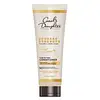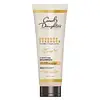What's inside
What's inside
 Key Ingredients
Key Ingredients

 Benefits
Benefits

 Concerns
Concerns

 Ingredients Side-by-side
Ingredients Side-by-side

Water
Skin ConditioningCetearyl Alcohol
EmollientDimethicone
EmollientGlycerin
HumectantBehentrimonium Chloride
PreservativeParfum
MaskingAmodimethicone
Cetrimonium Chloride
AntimicrobialPhenoxyethanol
PreservativeIsopropyl Alcohol
SolventLimonene
PerfumingNigella Sativa Seed Oil
EmollientRicinus Communis Seed Oil
MaskingLinum Usitatissimum Seed Oil
PerfumingLactic Acid
BufferingPropylene Glycol
HumectantGeraniol
PerfumingLinalool
PerfumingChlorhexidine Dihydrochloride
AntimicrobialSorbitol
HumectantZingiber Officinale Root Extract
MaskingFish Oil
Skin ConditioningCeramide AP
Skin ConditioningWater, Cetearyl Alcohol, Dimethicone, Glycerin, Behentrimonium Chloride, Parfum, Amodimethicone, Cetrimonium Chloride, Phenoxyethanol, Isopropyl Alcohol, Limonene, Nigella Sativa Seed Oil, Ricinus Communis Seed Oil, Linum Usitatissimum Seed Oil, Lactic Acid, Propylene Glycol, Geraniol, Linalool, Chlorhexidine Dihydrochloride, Sorbitol, Zingiber Officinale Root Extract, Fish Oil, Ceramide AP
Water
Skin ConditioningSodium Cocoyl Isethionate
CleansingDisodium Laureth Sulfosuccinate
CleansingSodium Lauryl Sulfoacetate
CleansingSodium Lauroyl Sarcosinate
CleansingGlycol Distearate
EmollientCocamidopropyl Betaine
CleansingParfum
MaskingDivinyldimethicone/Dimethicone Copolymer
Glycereth-26
HumectantDecyl Glucoside
CleansingPotassium Hydroxide
BufferingPPG-5-Ceteth-20
EmulsifyingCitric Acid
BufferingPolyquaternium-7
Propylene Glycol
HumectantPEG-55 Propylene Glycol Oleate
Polyquaternium-10
Sodium Chloride
MaskingAmodimethicone
Coco-Betaine
CleansingCarbomer
Emulsion StabilisingLimonene
PerfumingC11-15 Pareth-7
EmulsifyingBenzoic Acid
MaskingLaureth-9
EmulsifyingGlycerin
HumectantGeraniol
PerfumingC12-13 Pareth-23
CleansingC12-13 Pareth-3
EmulsifyingTrideceth-12
EmulsifyingSodium Benzoate
MaskingLinalool
PerfumingSalicylic Acid
MaskingMagnesium Nitrate
Benzyl Alcohol
PerfumingPhenoxyethanol
PreservativeNigella Sativa Seed Oil
EmollientRicinus Communis Seed Oil
MaskingBiotin
AntiseborrhoeicLinum Usitatissimum Seed Oil
PerfumingTetrasodium EDTA
Methylchloroisothiazolinone
PreservativeSorbic Acid
PreservativeMagnesium Chloride
Methylisothiazolinone
PreservativeSorbitol
HumectantZingiber Officinale Root Extract
MaskingWater, Sodium Cocoyl Isethionate, Disodium Laureth Sulfosuccinate, Sodium Lauryl Sulfoacetate, Sodium Lauroyl Sarcosinate, Glycol Distearate, Cocamidopropyl Betaine, Parfum, Divinyldimethicone/Dimethicone Copolymer, Glycereth-26, Decyl Glucoside, Potassium Hydroxide, PPG-5-Ceteth-20, Citric Acid, Polyquaternium-7, Propylene Glycol, PEG-55 Propylene Glycol Oleate, Polyquaternium-10, Sodium Chloride, Amodimethicone, Coco-Betaine, Carbomer, Limonene, C11-15 Pareth-7, Benzoic Acid, Laureth-9, Glycerin, Geraniol, C12-13 Pareth-23, C12-13 Pareth-3, Trideceth-12, Sodium Benzoate, Linalool, Salicylic Acid, Magnesium Nitrate, Benzyl Alcohol, Phenoxyethanol, Nigella Sativa Seed Oil, Ricinus Communis Seed Oil, Biotin, Linum Usitatissimum Seed Oil, Tetrasodium EDTA, Methylchloroisothiazolinone, Sorbic Acid, Magnesium Chloride, Methylisothiazolinone, Sorbitol, Zingiber Officinale Root Extract
 Reviews
Reviews

Ingredients Explained
These ingredients are found in both products.
Ingredients higher up in an ingredient list are typically present in a larger amount.
This water-soluble silicone is used for its hydrating and softening properties. It is used to add a silky feel to skincare products and has great benefits for haircare.
In haircare, this ingredient:
- Adds shine
- Protects color
- Offers thermal protection
- Boosts hair strength
- Does not build up as easily
Geraniol is used to add fragrance/parfum to a product. It is the main component of citronellol. It is a monoterpenoid and an alcohol.
Monoterpenes are naturally found in many parts of different plants.
Geraniol can be found in many essential oils including Rose Oil and Citronella Oil. The scent of Geraniol is often described as "rose-like". Many foods also contain Geraniol for fruit flavoring.
Geraniol can irritate the skin when exposed to air. However, irritation depends on the ability of geraniol to penetrate into the skin. In general, geraniol is not able to penetrate skin easily.
Geraniol is colorless and has low water-solubility. However, it is soluble in common organic solvents.
Like citronellol, it is a natural insect repellent.
2,6-Octadien-1-ol, 3,7-dimethyl-, (2E)-
Learn more about GeraniolGlycerin is already naturally found in your skin. It helps moisturize and protect your skin.
A study from 2016 found glycerin to be more effective as a humectant than AHAs and hyaluronic acid.
As a humectant, it helps the skin stay hydrated by pulling moisture to your skin. The low molecular weight of glycerin allows it to pull moisture into the deeper layers of your skin.
Hydrated skin improves your skin barrier; Your skin barrier helps protect against irritants and bacteria.
Glycerin has also been found to have antimicrobial and antiviral properties. Due to these properties, glycerin is often used in wound and burn treatments.
In cosmetics, glycerin is usually derived from plants such as soybean or palm. However, it can also be sourced from animals, such as tallow or animal fat.
This ingredient is organic, colorless, odorless, and non-toxic.
Glycerin is the name for this ingredient in American English. British English uses Glycerol/Glycerine.
Learn more about GlycerinLimonene is a fragrance that adds scent and taste to a formulation.
It's found in the peel oil of citrus fruits and other plants such as lavender and eucalyptus. The scent of limonene is generally described as "sweet citrus".
Limonene acts as an antioxidant, meaning it helps neutralize free radicals.
When exposed to air, oxidized limonene may sensitize the skin. Because of this, limonene is often avoided by people with sensitive skin.
The term 'fragrance' is not regulated in many countries. In many cases, it is up to the brand to define this term. For instance, many brands choose to label themselves as "fragrance-free" because they are not using synthetic fragrances. However, their products may still contain ingredients such as essential oils that are considered a fragrance.
Learn more about LimoneneLinalool is a fragrance and helps add scent to products. It's derived from common plants such as cinnamon, mint, citrus, and lavender.
Like Limonene, this ingredient oxidizes when exposed to air. Oxidized linalool can cause allergies and skin sensitivity.
This ingredient has a scent that is floral, spicy tropical, and citrus-like.
Learn more about LinaloolLinum Usitatissimum Seed Oil is the expressed oil from the dried ripe seed of the Linseed, Linum usitatissimum L., Linaceae
Nigella Sativa Seed Oil is a fragrance and is an oil.
Parfum is a catch-all term for an ingredient or more that is used to give a scent to products.
Also called "fragrance", this ingredient can be a blend of hundreds of chemicals or plant oils. This means every product with "fragrance" or "parfum" in the ingredients list is a different mixture.
For instance, Habanolide is a proprietary trade name for a specific aroma chemical. When used as a fragrance ingredient in cosmetics, most aroma chemicals fall under the broad labeling category of “FRAGRANCE” or “PARFUM” according to EU and US regulations.
The term 'parfum' or 'fragrance' is not regulated in many countries. In many cases, it is up to the brand to define this term.
For instance, many brands choose to label themselves as "fragrance-free" because they are not using synthetic fragrances. However, their products may still contain ingredients such as essential oils that are considered a fragrance by INCI standards.
One example is Calendula flower extract. Calendula is an essential oil that still imparts a scent or 'fragrance'.
Depending on the blend, the ingredients in the mixture can cause allergies and sensitivities on the skin. Some ingredients that are known EU allergens include linalool and citronellol.
Parfum can also be used to mask or cover an unpleasant scent.
The bottom line is: not all fragrances/parfum/ingredients are created equally. If you are worried about fragrances, we recommend taking a closer look at an ingredient. And of course, we always recommend speaking with a professional.
Learn more about ParfumPhenoxyethanol is a preservative that has germicide, antimicrobial, and aromatic properties. Studies show that phenoxyethanol can prevent microbial growth. By itself, it has a scent that is similar to that of a rose.
It's often used in formulations along with Caprylyl Glycol to preserve the shelf life of products.
Propylene Glycol is an odorless, colorless liquid. As a humectant, it helps skin retain moisture. It also aids in delivering active ingredients.
Another role of this ingredient is preventing a product from melting or freezing. Propylene glycol also adds antimicrobrial properties to a product, elongating product lifespan.
This ingredient is considered an organic alcohol and commonly added into both cosmetics and foods.
Those with sensitive skin or conditions may develop a rash when using this ingredient.
Learn more about Propylene GlycolRicinus Communis Seed Oil is the INCI name for castor oil.
Castor Oil helps moisturize the skin. It is rich in a fatty acid called ricinoleic acid. This fatty acid helps prevent moisture loss on the skin. This helps keep your skin soft and hydrated. Ricinoleic acid also has anti-inflammatory and pain reducing properties.
Besides hydrating the skin, castor oil is also used to hydrate hair. By keeping the hair shaft moisturized, breakage is decreased. More studies are needed to show castor oil's effective on stimulating hair growth.
Castor oil is created by cold-pressing castor seeds and then purifying the oil with heat. It was used in Ancient Egypt as fuel in lamps and to help treat eye irritation.
The term 'fragrance' is not regulated in many countries. In many cases, it is up to the brand to define this term. For instance, many brands choose to label themselves as "fragrance-free" because they are not using synthetic fragrances. However, their products may still contain ingredients such as essential oils that are considered a fragrance.
Learn more about Ricinus Communis Seed OilSorbitol is a sugar alcohol. It is a hydrating and moisturizing agent created from the reduction process of glucose.
Most sorbitol is usually made from potato starch. It is also found in fruits such as apples and pears.
As a humectant, Sorbitol helps draw water to the skin. This helps keep the skin hydrated. Sorbitol also helps create a thicker texture in products. You might find sorbitol in your toothpaste and other gels.
It is a non-irritating ingredient that is great for those with dry skin.
Sorbitol is a prebiotic. It helps promote the growth of healthy bacteria on your skin. The bacteria on your skin form a microbiome. This microbiome helps protect your skin from infection and harmful bacteria.
Learn more about SorbitolWater. It's the most common cosmetic ingredient of all. You'll usually see it at the top of ingredient lists, meaning that it makes up the largest part of the product.
So why is it so popular? Water most often acts as a solvent - this means that it helps dissolve other ingredients into the formulation.
You'll also recognize water as that liquid we all need to stay alive. If you see this, drink a glass of water. Stay hydrated!
Learn more about WaterZingiber Officinale is more commonly known as ginger.
Ginger root has antioxidant, anti-inflammation, and antimicrobial properties.
The antioxidant properties help protect your body from free-radicals. Free-radicals are molecules that may damage your skin cells. As a result, ginger may help slow down signs of aging such as hyperpigmentation and wrinkles.
Studies show ginger inhibits the enzyme that breaks down collagen. It also helps with:
This ingredient has no negative side-effects and is safe to use unless one has a specific allergy to it.
Ginger originates from Southeast Asia but has spread throughout the world. It is now a common spice used in many cultures.
Learn more about Zingiber Officinale Root Extract